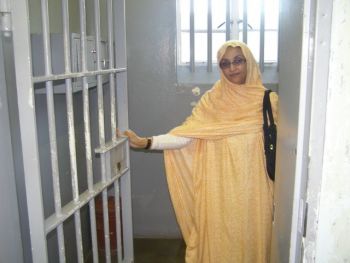“When I was 20 years old, I went through kidnapping and enforced disappearance. I spent about four years, having my eyes covered and without any trial… I went through different physical and psychological torture. After that, I was released and then I was subjected to continuous surveillance’, – A. Haidar shared with Amnesty International.
“In June 2005, I was tortured on the street; it caused me serious injury requiring 14 stitches and I had three broken ribs…
I was again arrested based on a fake police report. I was tried and sentenced to seven months imprisonment that I spent in a prison called ‘Lakhal,’ prison in Laayoune.
Children scared to loose their mother
“As women and mothers in Western Sahara, we are aware that we have a very difficult and important role; it is educate our children to stick to the Sahrawi identity, Sahrawi culture and Sahrawi traditions. It is not an easy task and it is not a new issue. The Occupation is always  trying to absorb the Sahrawi culture.
trying to absorb the Sahrawi culture.
“It is very difficult for a Sahrawi woman, as a mentor to instil these values and at the same time be an activist outside of her home… It is hectic for a woman activist who works in the human rights field… The children are always very scared to loose their mother.
Call for peace
“This generation and the children witness with their own eyes the police oppression…
Just imagine many children instead of drawing toys; they draw a policeman with a gun and a stick beating people and people behind bars. I am scared that they will become violent and incite violence… because practicing violence, one day will incite violence.
“It is our role as human rights defenders to call for peace…but our means are very limited, we are not authorized even to organise workshops, trainings… Now it’s becoming more difficult….”
Let Haidar back home!
In a statement the same day, Amnesty International called on Morocco to allow human rights activist Aminatou Haidar to return home.
According to the statement, she was offered release if she would publicly acknowledge Morocco’s “sovereignty” over Western Sahara. She refused to do so, and a few hours later she was put on a flight to Lanzarote in the Canary Islands.
Aminatou Haidar’s family say that she has become physically weak. Her health is at particular risk because she suffers from anaemia and a stomach ulcer. She is refusing to take her regular ulcer medication, as part of her hunger strike.
Insisting on her right to return to Western Sahara, Aminatou Haidar has rejected the possibility of obtaining refugee status in Spain. Without travel documents, Aminatou Haidar is effectively confined to Lanzarote.”
Her situation is further complicated by the fact that neither she, nor her family, can access her bank account. An anonymous source has told her family that a high-ranking Moroccan security agent instructed the bank to block her account.
On December 4, the Directorate General of the National Police and Civil Guard in Spain issued an exceptional permission for Aminatou Haidar to leave the Spanish territory, citing her right to freedom of movement.
That evening, she was accompanied to a plane in a wheelchair by her
doctor, her lawyer and Agustin Santos, a Spanish government official – only to be informed that permission to land in Laayoune had been denied by the Moroccan authorities.
Amnesty International believes that Aminatou Haidar’s expulsion and confiscation of her Moroccan identification document and passport are politically motivated and that she is being punished because of her stance on Western Sahara’s self-determination.
***
Aminatou Haidar, the 42-year old Sahrawi human rights campaigner was arrested and later expelled by Moroccan occupants in November this year. She has endured years of imprisonment and abuse but has continued to speak up for the right of her people to self-determination.
The Moroccan authorities confiscated Haidar’s passport on 13 November and expelled her from the country the following day. Stranded in Lanzarote Airport, in the Canary Islands, she has been on hunger strike since 15 November in protest.
Aminatou Haidar was detained at Laayoune airport, Western Sahara on 13 November when she returned from a month-long visit to other countries, including the USA where she accepted the 2009 Civil Courage Prize, awarded annually “for steadfast resistance to evil at great personal risk.”


